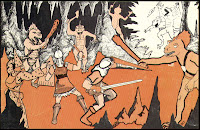I admit, I have always liked the way David C. Sutherland III drew a magic-user. Pointy hats, stars, long beard... I really can't imagine it being any different. Flipping through the excellent and classic Sutherland and Trampier art of the late 1970's Dungeons & Dragons, I find a cohesive design sense and style that readily inspires one to adventure. The almost ligne claire method of "DCS," and the very human proportions of his figures, in particular perfectly reflects the style of the J. Eric Holmes edition of Dungeons & Dragons, by giving you the basic outline and letting you fill the details in with your imagination.
I own a copy of the Holmes edition, and I am quite fond of it, but never seriously gave thought to running it. Holmes is sort of a messy proto-AD&D, which is great for people who want a game that is not cut and dried, but who cannot stomach the complexity of AD&D. Both of these descriptions match my style perfectly, but Holmes has the same problem for me that the original game has without Chainmail—the d20 combat rules, which produce absurdly high mortality rates.
Recently, however, the Holmesian artwork and Nicolas Dessaux's excellent Searchers of the Unknown have inspired me to take another look at a rough and tumble, rules-light way to play in the sandbox created by Sutherland and Trampier. My version of Searchers, which I am now calling Questers into the Unknown in homage to a HackMaster module, is quickly becoming a favorite game of mine. As one of my dear readers noticed, however, there is no magic system. This is largely intentional, of course, as I think any referee worth his salt can improvise the effects of a spell just based on the title of the spell (thus, keeping magic magical). Characters were meant to collect magic items (potions, wands, staves, scrolls, spell books) and spend them at their leisure, effectively making every character a magic-user (in the same way that, before Greyhawk, every character was a thief). But that still did not account for the fact that there were no pointy-hatted, long-bearded old men walking around in Questers. If I wanted to be true to the implied world of Holmesian art and fiction, I would need to account for this.
And so, here are the extremely optional rules for magic in Questers into the Unknown:
Spellcasting
While potions and wands have limited use, magical scrolls work slightly differently. When a hero tries to cast from a scroll, roll 1d10 against his armour class for the somatic element of the ritual. If the roll is equal or less, the scroll is cast successfully and may be cast again in the future. If the roll is higher, the scroll is destroyed, the magician visibly ages and he permanently loses 1 hit point (which may not be restored). Heroes may cast a number of spell scrolls a turn equal to their level (Hit Dice).
Thus, like everything in Questers, you are not bound by hard categories or numbers, but rather the development of the character is completely up to choice. Characters that are predominately spell casters will be lower hit points, older and not wear armour (and they will need a train of henchmen to carry all of their wands, staves, spell books, scrolls, potions etc). There is also room for a Gray Mouser-like thief, wearing light armour and casting a spell now and then. There is a simple spell burn mechanic to discourage overusing spells (especially for heavily armoured characters), but a dedicated magician can still turn on the fireworks and explode handfuls of spells in a single round of combat.


ReplyDeleteWORLD NEWS TODAY
EUROPEAN HEALTH INSURANCE CARD
WORLD NEWS TODAY